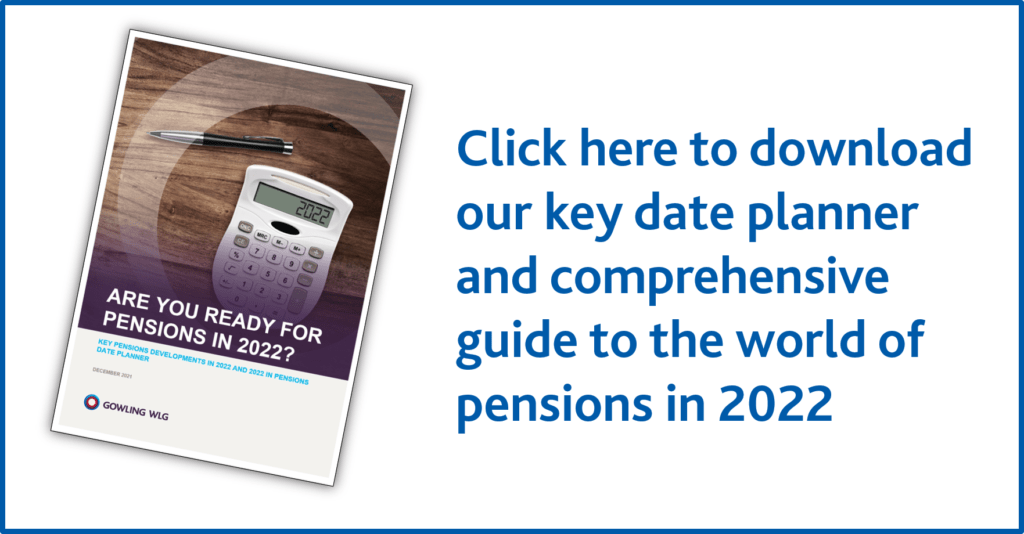This year, climate change was a key focus for the pensions and wider investment industries. Glasgow hosted the 26th UN Climate Change Conference (COP26). In anticipation of its role as host, the UK government issued a range of initiatives on climate change and financial services (including pensions).
In 2022, climate change will remain central to developments. But, in addition, there will be a broader focus on the wider environmental, social and governance (ESG) investment issues. The key developments to watch out for in 2022 include:
- climate change risk governance and reporting obligations applying to schemes with more than £1 billion of relevant assets;
- introduction of a new requirement to report against their investment portfolios’ alignment with the goals of the Paris Agreement (i.e. the intention to limit the global average temperature increase to within 1.5°C above pre-industrial levels);
- new statutory and non-statutory guidance on stewardship and reporting stewardship policies via Implementation Statements and Statements of Investment Principles.
Climate change risk and opportunity governance and reporting obligations become mainstream
The Occupational Pension Schemes (Climate Change Governance and Reporting) Regulations 2021 (the Climate Change Regulations) currently apply to:
- trustees or managers of an occupational pension scheme with relevant assets worth £5 billion or more on the first scheme year-end date which falls on or after 1 March 2020;
- authorised master trusts; and
- collective money purchase schemes (also known as collective defined contribution (CDC) schemes).
On 1 October 2022, the obligations in the Climate Change Regulations will also apply to trustees or managers of an occupational pension scheme with relevant assets worth £1 billion or more on the first scheme year-end date which falls on or after 1 March 2021.
This represents a massive extension of the reach of the Climate Change Regulations both in terms of number of schemes affected and the investments covered.
How many schemes will the Climate Change Regulations apply to?
At the moment, the Climate Change Regulations apply to roughly 100 schemes (c. 60 defined benefit schemes with assets above £5 billion plus 36 authorised master trusts). On and from 1 October 2022, this will be extended to a further 240 defined benefit schemes with assets above £1 billion.
What level of investments will be covered by the Climate Change Regulations?
Currently, schemes covered by the Climate Change Regulations hold investments worth roughly £700 billion. On and from 1 October 2022, this number will more than double to £1.45 trillion.
Introduction of a new climate change portfolio alignment metric
As well as the number of schemes covered being increased, the Climate Change Regulations will also be widened in scope. DWP is currently consulting on draft legislation and guidance that will require those schemes covered by the Climate Change Regulations to:
- measure; and
- report
on their investment portfolios’ alignment with the goals of the Paris Agreement (i.e. the intention to limit the global average temperature increase to 1.5°C above pre-industrial levels) (‘Climate and investment reporting: setting expectations and empowering savers (21 October 2021)’ (the Climate Reporting Consultation)).
This is intended to bring those schemes in line with updated guidance issued by the Task Force on Climate-Related Financial Disclosures (TCFD).
What does the draft guidance say?
Much of the detail underpinning the new climate change reporting requirements is set out in amended guidance. The amended guidance:
- covers the types of portfolio alignment metrics trustees should calculate and report; and
- the level of granularity (portfolio, section, fund, asset class) at which the selected metrics should be calculated and reported.
Improving and clarifying ESG stewardship and reporting
The DWP is consulting on ESG stewardship and reporting (‘Reporting on stewardship and other topics through the Statement of Investment Principles and the Implementation Statement: statutory and non-statutory guidance (21 October 2021)’ (the Stewardship Consultation)). The Stewardship Consultation sets out proposed guidance covering:
- understanding and consideration of financially material ESG factors;
- stewardship approaches in their investment decision-making;
- reporting requirements on:
- exercising rights attaching to; and
- undertaking engagement activities in respect of
scheme investments. This includes reporting in Statements of Investment Principles (SIPs) and Implementation Statements.
What are the key objectives for the proposed guidance?
The proposed guidance aims to meet four objectives:
- improving the quality of SIP policies;
- developing best practice for the reporting of Implementation Statements;
- clarifying how schemes may use disclosures from other frameworks (e.g. the UK Stewardship Code); and
- improving consistency across schemes’ reporting and practice by:
- defining key terms;
- highlighting the information that the government feels will be of most use to members; and
- clarifying the target audience for the Implementation Statements.
What areas does the proposed guidance focus on?
The proposed guidance focuses on the areas where existing policies and reporting are believed by the government to be weakest:
- stewardship (specifically, voting and engagement); and,
- consideration of financially material ESG factors and non-financial factors.
Once finalised, the proposed guidance will be non-statutory guidance in respect of SIPs. This will set out best practice that trustees may wish to follow. The proposed guidance in relation to Implementation Statements will, however, be statutory guidance to which trustees must have regard.
What does the Stewardship Consultation say about Implementation Statements?
The Stewardship Consultation says that Implementation Statements:
- should be presented in such a way that would allow a reasonably engaged and informed member to be able to interpret and understand trustees’ disclosures, and raise concerns or queries where appropriate;
- should explain how their stewardship activities are in scheme members’ and beneficiaries’ best interests;
- may want to consider both financial and non-financial matters in their stewardship activities;
What does the Stewardship Consultation say about SIPs?
The Stewardship Consultation suggests that SIPs should consider many of the factors relevant to producing Implementation Statements (e.g. considering the audience, setting out how stewardship decisions are in the members’ best interests etc.).
Final guidance expected in 2022
The consultation closes on 6 January 2022. Final guidance is expected later in 2022 once the government has had time to digest responses.

About the author(s)
Ian is a London-based professional support lawyer (PSL) legal director. Ian is a member of our pensions and combined human resource solutions (CHRS) teams. He works with clients to solve their employment and pensions law issues. Ian maintains a particular focus on 'crossover' issues that benefit from his understanding of both areas of law.

